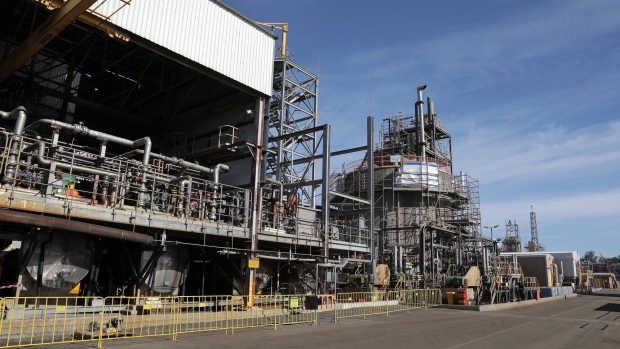Aug 21, 2023
BHP’s Full-Year Profit Falls 37% as China’s Metals Demand Wanes
, Bloomberg News

(Bloomberg) -- BHP Group Ltd., the world’s biggest miner, reported its lowest annual profit in three years, and warned the outlook for China was uncertain as the nation grapples with a brewing crisis in the steel-intensive construction sector.
Beijing had put “policies in place that are meant to stimulate new starts” in the property sector, “but they’re not translating as effectively into changes on the ground as certainly we were anticipating,” Chief Executive Officer Mike Henry said in an interview on Bloomberg TV.
“It is fair to characterize it as a bit uncertain,” he said. China is by far BHP’s biggest customer for iron ore.
Twelve months after posting its highest-ever profit as prices soared, the deteriorating economic outlook in the world’s biggest metals consumer has brought double-digit percentage declines to BHP’s earnings from copper, coal and nickel. Inflation, particularly in labor costs, had also put pressure on profits, the Melbourne-based company said Tuesday.
BHP’s plunging earnings mirror those posted by iron ore rival Rio Tinto Group last month, with miners holding their breath for an upswing in China’s economy since Beijing abandoned “Covid Zero” restrictions last November.
A slew of recent data suggest steel and iron ore demand could contract for the rest of the year, with the Chinese property market still in a trough. Authorities have been unwilling to encourage massive building despite the slowdown reflected in July’s industrial output.
Read More: Solving China’s Steel Demand Mystery: Energy Daily
BHP said India, a top customer for its metallurgical coal used in steelmaking, represented a “bright spot” for global commodity demand, with the government there aiming to more than double steel production capacity to 300 million tons a year by 2030.
BHP’s underlying attributable profit from continuing operations fell 37% to $13.4 billion in the 12 months to June 2023, below analysts’ estimates. It will pay a final dividend of 80 cents per share, compared with $1.75 the year before. The company’s Sydney-based shares fell as much as 2% on Tuesday.
“The main risk for BHP in the near-term relates to the Chinese economy,” analysts at Jefferies LLC, including Christopher LaFemina, said in a note on Tuesday. “While the market may focus on capex and costs, the bigger concern is the risk of a worsening deflationary downturn in the Chinese housing market.”
BHP has put “future-facing commodities” copper, nickel and potash at the center of its growth plans, driven by population growth, urbanization and the clean energy transition. Henry said capital expenditure would increase to around $10 billion in the current financial year, up from $7.1 billion last year, as the company invests more in these minerals. It hopes these minerals will eventually make up 50% of its total business, with iron ore and coking coal accounting for the rest.
The miner said it is also studying increasing annual iron ore production from its Australian operations to 330 million tons a year, up from 285 million tons now. BHP gave no update on the progress of the sale of two coal mines in Australia’s Queensland state.
--With assistance from Yvonne Man and Rishaad Salamat.
(Updates with comments on Indian steel outlook in seventh paragraph. A previous version of this story corrected the current total Australian iron ore production figure in final paragraph)
©2023 Bloomberg L.P.






